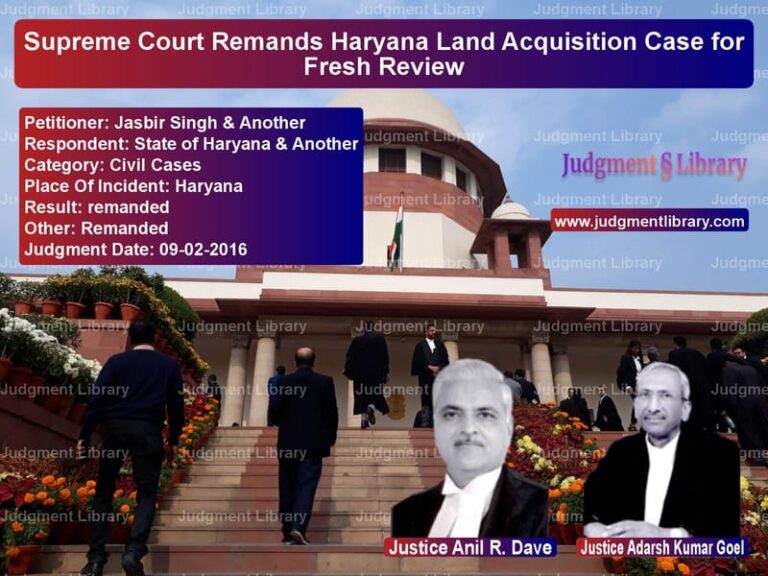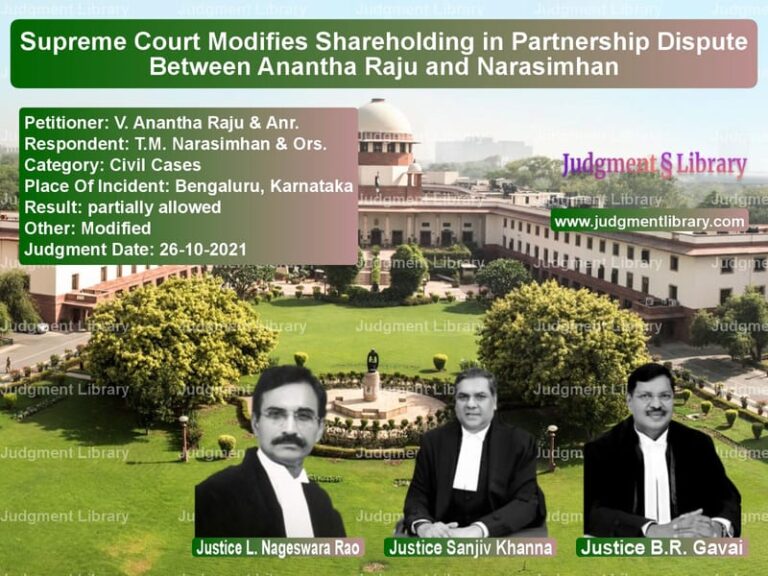Bank Loan Recovery and Mortgage Disputes: Tripower Enterprises vs. State Bank of India
The case of M/s. Tripower Enterprises (Private) Limited vs. State Bank of India & Ors. revolves around a critical legal dispute concerning loan recovery, mortgage validity, and the rights of an auction purchaser. The case primarily deals with the return of original mortgage documents to the auction purchaser after the sale of a mortgaged property in a public auction by the bank.
The dispute arose after the borrower, M/s. Rukmini Mills Ltd., defaulted on a loan taken from the State Bank of India (SBI). As a result, SBI initiated proceedings under the Securitisation and Reconstruction of Financial Assets and Enforcement of Security Interest (SARFAESI) Act, 2002. The legal battle spans multiple stages, including decisions from the Debts Recovery Tribunal (DRT), Debts Recovery Appellate Tribunal (DRAT), and ultimately, the Supreme Court.
Background of the Case
The borrower, Rukmini Mills Ltd., had taken loans from SBI, backed by a mortgage created on certain immovable properties owned by Associated Trading Corporation Pvt. Ltd., which acted as the guarantor. The borrower defaulted on repayment, leading SBI to classify the loan as a Non-Performing Asset (NPA) and initiate legal proceedings.
After a failed challenge by the guarantor against SBI’s actions, the bank proceeded to auction the mortgaged property. M/s. Tripower Enterprises emerged as the highest bidder in an e-auction and was issued a sale certificate by the bank. However, a dispute arose regarding the return of the original mortgage documents, which were deposited with the DRT as part of ongoing legal proceedings.
Legal Issues Raised
The case involved several legal questions, including:
- Whether SBI was entitled to the return of original mortgage documents from the DRT for handing them over to the auction purchaser.
- Whether the mortgage created in favor of SBI was valid, given the objections raised by the guarantor.
- Whether the auction purchaser, having legally acquired the property, had the right to receive the original title documents.
- Whether the High Court was correct in reversing the DRAT’s decision allowing the return of documents to the bank.
Arguments by the Petitioner
M/s. Tripower Enterprises, the auction purchaser, presented the following arguments:
- Having purchased the property in a public auction and received a sale certificate, it was entitled to receive the original title documents.
- The mortgage was valid, as upheld in multiple earlier proceedings before the DRT and DRAT.
- The guarantor had previously admitted to the existence of the mortgage and had even offered to settle the outstanding dues.
- The objections raised by the guarantor were an attempt to delay the transfer of the property and obstruct the legitimate rights of the auction purchaser.
Arguments by the Respondents
The State Bank of India and the guarantor countered these claims with the following arguments:
- The mortgage was invalid, as it had been created by individuals who were allegedly not authorized to do so on behalf of the guarantor.
- The return of documents should be delayed until the validity of the mortgage was conclusively determined in the pending proceedings.
- The High Court’s decision to retain the documents with the DRT until the final disposal of the case was justified.
Supreme Court’s Observations
The Supreme Court made the following significant observations in its ruling:
“The guarantor cannot be allowed to approbate and reprobate, having earlier admitted to the mortgage and even offering to settle dues. The objections raised at this stage appear to be an afterthought aimed at frustrating the rights of the auction purchaser.”
The Court further held:
- The DRAT was correct in ordering the return of the original mortgage documents to SBI, as the sale had been completed and a sale certificate had been issued.
- The High Court erred in reversing the DRAT’s order, as doing so unnecessarily prolonged the litigation and created uncertainty for the auction purchaser.
- The validity of the mortgage could still be examined in the pending proceedings, but that did not justify withholding the documents from the rightful purchaser.
- The DRT should complete the pending proceedings within a specified timeframe to avoid further delays.
Final Judgment
The Supreme Court set aside the High Court’s ruling and upheld the DRAT’s decision, allowing SBI to receive the original mortgage documents and hand them over to M/s. Tripower Enterprises. However, it clarified that the pending litigation regarding the mortgage’s validity would continue in the appropriate forum.
Implications of the Judgment
This ruling has significant implications for financial institutions, auction purchasers, and borrowers:
- It reinforces the principle that once a property is sold in a valid auction, the purchaser is entitled to receive all associated title documents.
- It limits the ability of borrowers and guarantors to raise frivolous objections after a sale is completed.
- It ensures that auction processes are not derailed by ongoing disputes, thereby maintaining the integrity of banking and recovery mechanisms.
Conclusion
The case of M/s. Tripower Enterprises vs. State Bank of India highlights the complexities involved in loan recovery, mortgage disputes, and auction sales. The Supreme Court’s ruling ensures that legal principles governing secured transactions and auction purchases are upheld, providing clarity to banks, borrowers, and property buyers alike.
Petitioner Name: M/s. Tripower Enterprises (Private) Limited.Respondent Name: State Bank of India & Ors..Judgment By: Justice A.M. Khanwilkar, Justice Ajay Rastogi.Place Of Incident: Madurai, Tamil Nadu.Judgment Date: 24-04-2020.
Don’t miss out on the full details! Download the complete judgment in PDF format below and gain valuable insights instantly!
Download Judgment: Ms. Tripower Enterp vs State Bank of India Supreme Court of India Judgment Dated 24-04-2020.pdf
Direct Downlaod Judgment: Direct downlaod this Judgment
See all petitions in Bankruptcy and Insolvency
See all petitions in Corporate Compliance
See all petitions in unfair trade practices
See all petitions in Judgment by A M Khanwilkar
See all petitions in Judgment by Ajay Rastogi
See all petitions in partially allowed
See all petitions in Modified
See all petitions in supreme court of India judgments April 2020
See all petitions in 2020 judgments
See all posts in Corporate and Commercial Cases Category
See all allowed petitions in Corporate and Commercial Cases Category
See all Dismissed petitions in Corporate and Commercial Cases Category
See all partially allowed petitions in Corporate and Commercial Cases Category







